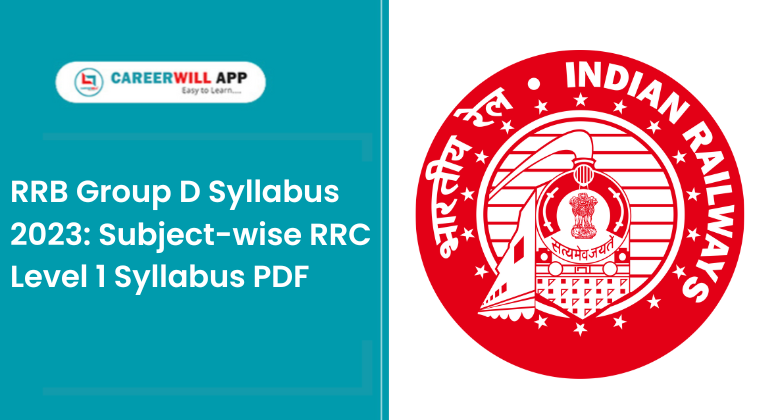Mastering RRB Group D: A Comprehensive Guide to the Syllabus
Mastering RRB Group D: A Comprehensive Guide to the Syllabus
Blog Article

The Railway Recruitment Board (RRB) Group D exam is one of the most competitive examinations in India,RRB Group D Syllabus attracting millions of aspirants every year. The RRB Group D recruitment process is an essential gateway to securing a job in the Indian Railways, and understanding its syllabus is crucial for effective preparation. In this guide, we will break down the RRB Group D syllabus, helping you craft a strategic plan to tackle the exam with confidence.
1. Exam Overview
The RRB Group D exam consists of multiple stages: a computer-based test (CBT), physical efficiency test (PET), document verification, and medical examination. The CBT is the most important stage, consisting of 100 multiple-choice questions (MCQs) to be answered in 90 minutes. These questions are divided into four major sections: Mathematics, General Intelligence and Reasoning, General Science, and General Awareness. The objective of the exam is to test a candidate’s knowledge, problem-solving skills, and general aptitude.
2. Detailed Breakdown of the Syllabus
a. Mathematics (25 Questions, 25 Marks)
This section focuses on basic mathematical concepts. Candidates should be proficient in solving arithmetic problems quickly and accurately. Some of the key topics include:
Number System: Understanding of natural numbers, integers, fractions, and decimals.
Simplification: Techniques for quick calculation without a calculator.
Percentage, Ratio & Proportion: Solving real-life problems using these concepts.
Time and Work: Understanding how to calculate work done and time taken.
Profit & Loss: Basic calculations involving cost price, selling price, profit, and loss.
Simple and Compound Interest: Basic principles and calculations.
Algebra: Solving simple equations and understanding algebraic expressions.
b. General Intelligence and Reasoning (30 Questions, 30 Marks)
This section assesses logical reasoning and problem-solving ability. Key topics include:
Analogy: Identifying relationships between objects or concepts.
Classification: Grouping similar items together.
Syllogism: Logical reasoning involving statements and conclusions.
Venn Diagrams: Solving problems based on set theory.
Blood Relations: Understanding family relationships.
Directions: Solving questions based on positional concepts.
Coding-Decoding: Identifying patterns in letter or number sequences.
This section requires a strategic approach, as questions can be tricky. Practice and time management are critical.
c. General Science (25 Questions, 25 Marks)
General Science tests the candidate’s basic knowledge of science in everyday life. It includes topics from Physics, Chemistry, and Biology. Key areas include:
Physics: Basic concepts of force, energy, and motion.
Chemistry: Elements, compounds, acids, bases, and salts.
Biology: The human body, plants, animals, and environmental science.
Candidates need to focus on fundamental concepts and important definitions, as the questions are designed to test general awareness of scientific principles.
d. General Awareness (20 Questions, 20 Marks)
This section is all about keeping up with current affairs, general knowledge, and history. Key areas to cover include:
Current Affairs: Focus on national and international events, sports, economics, politics, and government schemes.
History: Important events in Indian history and freedom struggle.
Geography: Basic facts about the geography of India and the world.
Culture and Heritage: Knowledge about India’s cultural heritage and traditions.
Indian Economy: Key economic terms, major economic developments, and policies.
The General Awareness section is often tricky due to its broad scope, so staying updated with daily news and revising regularly is crucial.
3. Preparation Tips
To crack the RRB Group D exam, a strategic approach is essential. Here are some preparation tips:
Understand the Exam Pattern: Knowing the structure and timing will help you stay organized.
Set a Study Plan: Dedicate specific time slots for each subject. Focus on weak areas but also revise regularly.
Solve Mock Tests: Take as many mock tests as possible to simulate the actual exam experience.
Focus on Speed and Accuracy: Time management is crucial. Practice solving questions quickly without compromising accuracy.
Stay Updated: For the General Awareness section, read newspapers, magazines, and websites regularly.
Use Standard Study Materials: Rely on trusted books and online resources for preparation. Refer to previous years' question papers to understand the pattern.
4. Conclusion
Mastering the RRB Group D syllabus requires a disciplined and focused approach. By breaking down the syllabus, understanding the exam structure, and dedicating time to each section, candidates can enhance their chances of success. With consistent effort, strategic planning, and a positive mindset, aspirants can clear the RRB Group D exam and secure a promising career in the Indian Railways. Stay committed, stay focused, and good luck!
Report this page